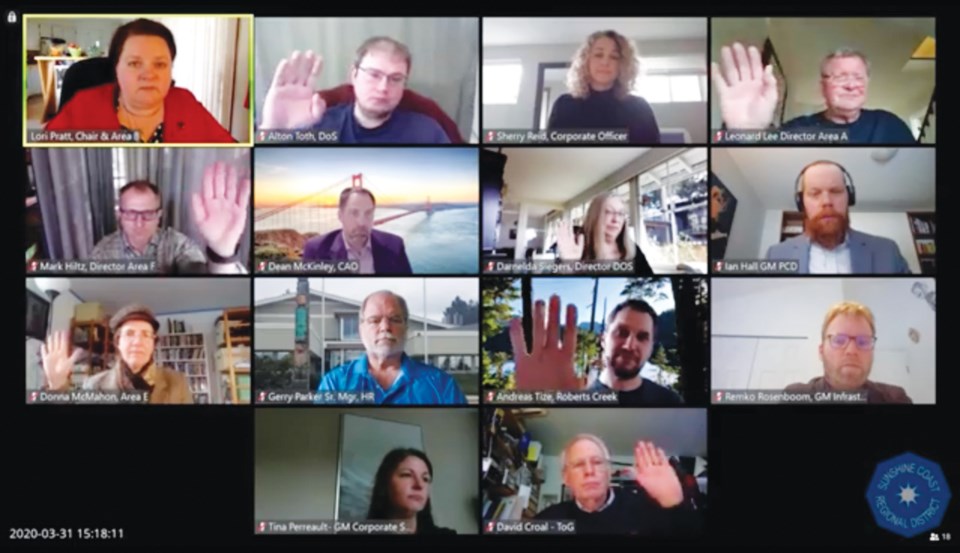It took overtime work by staff and two back-to-back emergency meetings, but Sunshine Coast Regional District (SCRD) directors managed to cut this year’s tax increase by nearly two thirds in response to the economic downturn caused by COVID-19.
The overall property tax increase now stands at 4.7 per cent, which translates to about $950,000, down from the $2.6 million in increased taxes the SCRD had anticipated collecting.
Sechelt Director Alton Toth, who had voted against the original budget when it was adopted March 12, called the turnaround “nothing short of remarkable.”
When directors adopted the controversial $73-million budget, the overall tax increase stood at 12.9 per cent. But in light of what Sechelt director Darnelda Siegers described last week as an “unprecedented change in the community,” directors asked staff to see what they could do to relieve taxpayers.
Following that directive from last Thursday’s corporate and administrative services committee meeting, staff returned after the weekend with suggested amendments at an emergency meeting March 30. Further changes were made and the budget amendments were unanimously adopted at a second emergency board meeting the following day.
The time crunch came because amendments had to be made by April 1, since the SCRD sends tax requisitions to the province and member municipalities shortly thereafter, according to chief financial officer Tina Perreault.
Residential tax increases have been amended as follows: Area A taxes increased by 2.5 per cent, Area B by 1.1 per cent, Area D by 3.62 per cent, Area E by 2.5 per cent, Area F by 3.2 per cent, Sechelt Indian Government District by 1.9 per cent, District of Sechelt by 0.9 per cent and the Town of Gibsons by 3.8 per cent. Area B Islands will see their taxes go up by 11.5 per cent and Area F Islands have an increase of 4.6 per cent for Keats and 11.3 per cent for Gambier.
SCRD taxes make up only a portion of the municipal tax bills.
Parcel taxes and user fees to pay for the regional water system aren’t changing – they’ll still increase by 25 per cent. The previously adopted 14 per cent rate increase for refuse collection for the rural areas excluding Area A didn’t change, and neither did fees for the SCRD’s small wastewater treatment plants.
To reduce the tax increase, directors picked through an assortment of recommendations by staff over the course of the three meetings.
Operating reserves were tapped to fund a bevy of projects, including to pay for capital upgrades and future planning at recreation facilities, space planning and IT hardware for SCRD offices at Field Road, climate change initiatives, Suncoaster Trail work and funding for a regional housing conference, resulting in a tax savings of about $355,000.
Two projects were deferred to 2021: a watershed governance feasibility study and a pilot project and survey for free public transit for youth.
The record number of staffing positions approved in the original budget, and which District of Sechelt directors opposed, were reduced from 15 full-time equivalent positions. A water data technician, water conservation technician, “strategic initiatives” position and workplace safety position were kept, along with a ports position. The rest have been deferred to 2021, saving approximately $340,000 in taxation.
Staff also recommended lowering or deferring annual contributions to reserves, which further reduced taxes by $380,000.
Finally, staff recommended using operating reserves to pay for some services, since policy indicates that they could be used to “potentially mitigate some of the taxation for this year,” said Perreault. That move reduced taxes by another $362,000.
Directors supported the bulk of those recommendations, made at the March 30 meeting, but asked staff to take another look at recreation facility spending, which makes up the bulk of taxation in most areas.
“I do appreciate it’s complicated and we are looking at a stupid deadline,” said Elphinstone director Donna McMahon at the meeting. “My discomfort is that people are losing their jobs and we are taxing for aqua fit. It’s not a good scenario.”
Staff came back with an additional $200,000 decrease in taxes connected to community recreation facilities. Planning and community development general manager Ian Hall said the reduction is the “optimistic realist approach,” since it provides enough flexibility if facilities are able to open later this year, though realistically, they may not.
During the discussion, infrastructure services general manager Remko Rosenboom advised that deferrals to some water projects were likely.
One project directors chose to take a second look at was a $239,980 contract they had approved at committee to award to Integrated Sustainability Consultants Ltd. for Phase 4 of the raw water feasibility study.
That phase would see design and cost estimates for Site B updated, among other things. The project is currently estimated at $53 million.
Rather than cancel the contract, directors voted to defer the decision to a future board meeting, and asked staff to explain the implications if they decide to amend the project.
At the March 31 meeting, as directors prepared to amend the budget, they also took time to commend staff. “I know people here in Gibsons are going to be very happy with what you’ve been able to shave this down to,” said Gibsons director David Croal. “I just want to commend you and applaud all your efforts.”
Not everyone was satisfied with the outcome, however. In a March 28 letter to the board, the Sechelt and District Chamber of Commerce urged the SCRD to reduce taxation further, and following the adoption of the amended budget, chair John Henderson said it was “an understatement” that the chamber board was disappointed that its letter was not discussed at the meeting.
“The SCRD Board have chosen to retain an optimistic budget involved a increase of almost 5% in taxes and 25% in various user fees. This, instead of taking a more pessimistic – and many say, realistic – view of the current realities. The fact is that if the Board had taken a more cautious approach, taxpayers would pay less now.”



